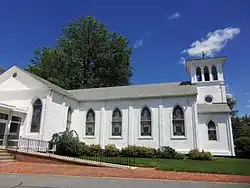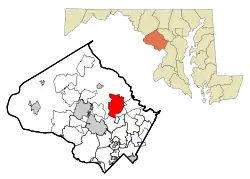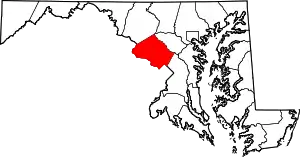Olney, Maryland
Olney is a U.S. census-designated place and an unincorporated area in Montgomery County, Maryland. It is located in the north central part of the county, twenty miles (32 km) north of Washington, D.C.
Olney, Maryland | |
|---|---|
 Olney's St. John's Episcopal Church in 2013. | |
 Location of Olney in Maryland | |
| Coordinates: 39°9′11″N 77°4′29″W | |
| Country | |
| State | |
| County | |
| Area | |
| • Total | 13.0 sq mi (33.7 km2) |
| • Land | 13.0 sq mi (33.6 km2) |
| • Water | 0.0 sq mi (0.0 km2) |
| Elevation | 541 ft (165 m) |
| Population (2010) | |
| • Total | 33,844 |
| • Density | 2,603.4/sq mi (1,004.3/km2) |
| Time zone | UTC−5 (Eastern (EST)) |
| • Summer (DST) | UTC−4 (EDT) |
| ZIP codes | 20830, 20832, 20833 |
| Area code(s) | 301, 240 |
| FIPS code | 24-58900 |
| GNIS feature ID | 0590948 |
| Website | http://www.OlneyMD.com/ |
Olney was largely agricultural until the 1960s, when growth of Washington, D.C.'s suburbs led to its conversion into a mostly residential area. As generally defined, Olney had a total population of 33,844 in the 2010 U.S. Census. In 2013 it was ranked #22 in Money magazine's "top-earning towns" edition of "America's Best Places to Live."[1] In 2007, Olney ranked #17 on Money magazine's list of the 100 best places to live in the U.S.
History
In 1763, Richard Brooke received a patent for a tract of land located in the Province of Maryland.[2] Originally known as Mechanicsville,[2] the village which became Olney was established in 1800. The area was mostly farmland, but it soon began attracting artisans. Early residents Sarah Brooke and Dr. Charles Farquhar were devotees of the English poet William Cowper, and named their home after the poet's hometown of Olney in England.[2] The area was later named for their home, which still stands and is known as the Olney House. In the town's center was a blacksmith, William Kelley's wheelwright shop, Canby's pottery factory, and a Benedict Duley's store.[2]
The Brooke family held the largest tracts of land in Olney, whose central village was at the intersection of the Rockville to Baltimore road, and the one which connected Washington with Westminster to the north. The Quaker community in Sandy Spring thrived just to Olney's east. The Sandy Spring Museum is a historical museum featuring educational programs and displays. St. John's Episcopal Church was established in 1842 and survives to this day.
After the siege of Washington by the British in 1814 during the War of 1812, President Madison and his family passed through Olney en route to taking refuge in the neighboring town of Brookeville.[3] Although not as involved in the Civil War as areas of Maryland to the west, Olney residents still experienced the tug-of-war between loyalty to the plantation economy of the South and to the Federal government in Maryland's midst. Both Union and Confederate forces made stops in Olney during the war. Union Generals George B. McClellan and Ambrose Burnside led soldiers through in the midst of the Maryland Campaign in 1862. During the Gettysburg Campaign in 1863, Confederate General J. E. B. Stuart marched between 10,000 to 20,000 troops north through the village and raided it of supplies, including horses and crops from surrounding farms in which they bivouacked.[4]
Olney served as the original headquarters of the Emergency Management Institute, founded in 1951 as the Civil Defense Staff College (CDSC) to provide training for civil defense. While there, the college built "Rescue Street," a training center designed to resemble atomic bomb ruins.[5] The CDSC was soon relocated to Battle Creek, Michigan due to security concerns of a potential attack on Washington, D.C. during the Cold War.[6]
Geography
As an unincorporated area, Olney's boundaries are not officially defined. The United States Census Bureau defines a census-designated place of Olney centered at 39°9' North and 77°5' West. It has a total area of 13.0 square miles (34 km2), all land.
Olney's town center sits at the intersection of state route 97 (Georgia Avenue) and route 108 (Olney-Laytonsville Road). The town, larger than any other in the neighboring areas, lies south of Brookeville, west of Sandy Spring, east-northeast of Gaithersburg, north-northeast of Rockville, and north of Aspen Hill.
Demographics
At the 2010 U.S. Census,[7] there were 33,844 people, 11,606 households, and 9,447 families residing in the area. The population density was 2,603.4 people per square mile (1,004.3/km2). There were 11,879 housing units at an average density of 913.8 per square mile (352.5/km2). The ethnic makeup of the area was 75.1% White, 11.9% African American, 12.0% Asian, 8.5% Hispanic or Latino, and 0.53% Native American. 3.1% of the population identifies with "Some Other Race."
There were 11,606 households, of which 81.4% were family households. Among all households:
- 41.7% had children under the age of 18 living with them.
- 67.2% were married couples living together.
- 11.0% had a female householder with no husband present.
- 3.1% had a male householder with no wife present.
- 22.8% had individuals 65 years and over.
- 18.6% were non-families.
The average household size was 2.91 and the average family size was 3.25.
28.9% of residents were under the age of 20, 25.8% from 20 to 44, 34.4% from 45 to 64, and 10.8% 65 years of age or older. The median age was 41.9 years. For every 100 females, there were 91.8 males.
According to a 2015 survey, the median household income was $126,762, and the median family income was $138,072. Males had a median income of $96,624 versus $68,709 for females. The per capita income for the area was $48,289. 2.8% of the population and 2.3% of families were below the poverty line.[8]
Education
There are three Montgomery County Public School clusters that bisect Olney, with some children attending elementary and middle schools that send students on to Magruder High School and others attending schools that send students to Sherwood High School or James Hubert Blake High School. The Our Lady of Good Counsel High School building opened in January 2007, enabling the Roman Catholic high school to relocate to Olney from Wheaton, Maryland. The new building of Washington Christian Academy opened in 2008 in Olney. Brooke Grove Elementary School, a public elementary school in Olney, was awarded in 1999 the Blue Ribbon School for Excellence. Cashell Elementary School was also selected as a 2014 National Blue Ribbon School. Other elementary schools serving Olney include Olney Elementary School, Belmont, and Sherwood. Middle schools include William Farquhar and Rosa Parks.
Culture

The historic Olney Ale House continues to operate on the east edge of town. Farther east lies the Sandy Spring Museum and Woodlawn Manor Living History Museum.[9] Olney is also home to MedStar Montgomery Medical Center, a branch of the Montgomery County Library, the Olney Swim Center, and the Norbeck golf course.
Olney is also home to the Olney Big Band and Olney Concert Band.[10]
Olney is the home to Rock N' Roll Revival, which is an annual show and community tradition at Sherwood High School.[11][12]
Olney has more than a dozen houses of worship of multiple faiths, including Catholic, Episcopalian, Methodist, Jewish, Seventh-Day Adventist, Baptist, and Latter-Day Saints.
Every year at the end of April, a community festival known as "Olney Days" is held, including a parade, charity bike ride and walk, movie night, and other activities.
Recreation
Playgrounds, playing fields and courts are available throughout Olney and the surrounding area. Many of the parks are public and some belong to homeowners or other private associations. Public parks include Olney Manor Park (featuring the Olney Swim Center, a year-round indoor public pool), Southeast Olney Park, Longwood Park, Cherrywood Park, Bowie Mill Park, and the OBGC Park at Freeman Fields.
Olney is also home to a private country club and a golf driving range.
As an all-volunteer (but for a handful of admin staff) non-profit organization, OBGC has provided sports recreation and training for over 45,000 Olney youth since 1969.[13] (April 2005) In 1999 Joshua Freeman and The Carl M. Freeman Foundation joined with the Olney Boys and Girls Community Sports Club to bring additional youth recreational facilities to the Olney Community. Freeman Fields is named in memory of Carl M. Freeman.[14] As the site of OBGC Park, Falling Green had been an active farm since 1764.[15] A house and barn survive from the original farm. Falling Green house, built in 1770 by Quaker planter Basil Brooke, is one of Montgomery County, MD's prominent expressions of Georgian architecture.[16]
Olney Theatre
Founded in 1938, the Olney Theatre is one of two state theaters in Maryland. It presents professional level dramatic and musical live theatrical productions in its large and modern playhouse on the east edge of town, drawing audiences from across the Washington metropolitan area. Actors who have appeared in performances at the Olney Theater include Helen Hayes, Lillian Gish, Gloria Swanson, Tallulah Bankhead, Paulette Goddard, Eve Arden, Burl Ives, John Carradine, Olivia de Havilland, Hume Cronyn, Jessica Tandy, José Ferrer, Carol Channing, Frances Sternhagen, Laurence Luckenbill, Uzo Aduba, Sir Ian McKellan, Roger Bart, Marcia Gay Harden, and Wilson Jermaine Heredia.
Notable people
- Joe Aitcheson Jr., jockey in Racing Hall of Fame, was born in Olney.
- Secretary of the Interior Harold L. Ickes bought the 250-acre (1.0 km2) Headwaters Farm in 1937. His wife maintained the farm after his death in 1952 until she sold it in 1971. The Ickes' large white house still stands in the middle of the original core of the Olney Oaks development/subdivision.[17]
- Frank Miller, an artist and film director best known for his film noir-style comic book stories, was born in Olney.
- Justin Maxwell, outfielder for the Lotte Giants.
- Stefon Diggs, wide receiver for the Buffalo Bills, attended Our Lady of Good Counsel in Olney, Maryland.
- Moira Geoffrion was born in Olney.
- Ali Raza, Commissioner of the Rockville, Maryland District Court System, was raised in Olney, Maryland.
References
- Lampert, Jacqueline (August 13, 2013). "Four Washington-area towns make Money Magazine's top-earning list". Washington Business Journal. Retrieved July 18, 2016.
- Sween, Jane C.; Offutt, William. Montgomery County: Centuries of Change. American Historical Press, 1999. ISBN 1-892724-05-7.
- Hughes, Will (November 14, 2012). "Capital for a Day". Boundary Stones. WETA. Retrieved July 18, 2016.
- Farquhar, Robert Brooke (1954). Historic Montgomery County, Maryland: Old Homes and History. University of Michigan. pp. 148, 243.
- Furman, Bess (June 24, 1952). "Atom Bomb 'Ruins' Will Aid Defense". The New York Times. Retrieved May 3, 2018.
- "Emergency Management Institute (EMI) Overview". Federal Emergency Management Agency. Retrieved May 3, 2018.
- "Community Facts (for Olney CDP, Maryland)". American FactFinder. United States Census Bureau. Archived from the original on February 14, 2020. Retrieved September 27, 2016.
- "Selected Economic Characteristics – 2015 American Community Survey". American FactFinder. United States Census Bureau. Archived from the original on February 13, 2020. Retrieved September 22, 2017.
- "(in process of moving) to Historic Brookeville Academy". Woodlawn Manor Museum. Retrieved September 27, 2016.
- "Olney Concert Band". Olney Concert Band. Retrieved September 27, 2016.
- Agresti, Aimee (March 2, 2003). "Olney's Golden Oldies". Washington Post. ISSN 0190-8286. Retrieved January 23, 2021.
- Brachfeld, Melissa J. (March 3, 2008). "Sherwood High to present Rock 'n' Roll Revival". The Gazette. Retrieved May 3, 2018.
- "OBGC History & Info". Olney Boys & Girls Club (OBGC). Olney Boys and Girls Community Sports Association. Archived from the original on October 1, 2016. Retrieved September 27, 2016.
- "Legacy Grants". Carl M. Freedman Foundation. Archived from the original on October 11, 2016. Retrieved September 27, 2016.
- "OBGC Park History". Olney Boys and Girls Community Sports Association. (c) 2016 Olney Boys & Girls Community, (c) 2016 Demosphere International, Inc. Retrieved September 27, 2016.
- "Falling Green House". Falling Green House. Olney Boys and Girls Community Sports Association. Retrieved September 27, 2016.
- "Homeland Village History". Homeland Village Community Association. Retrieved July 18, 2016.
External links
| Wikimedia Commons has media related to Olney, Maryland. |
 Olney travel guide from Wikivoyage
Olney travel guide from Wikivoyage Geographic data related to Olney, Maryland at OpenStreetMap
Geographic data related to Olney, Maryland at OpenStreetMap- Olney, Maryland Community web page
- Olney, Maryland Chamber of Commerce web page
